Five talking points from stage 11 of the Vuelta a España 2020
A protest and a Frenchman taking stage honours
David Gaudu delivers Grouapam-FDJ much-needed win
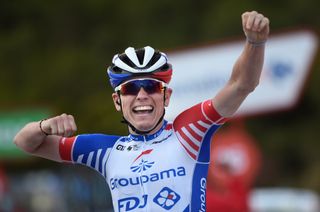
David Gaudu delivered a much-needed victory for a Groupama-FDJ team that had up until now endured a miserable Vuelta a España.
In stark contrast to the team’s huge success at the Giro d’Italia, where Arnaud Démare won four sprint stages, the team’s Vuelta got off to a disastrous start with both of their GC hopes, Thibaut Pinot and David Gaudu, losing time over the first couple of stages.
Whereas Pinot has since abandoned, Gaudu has managed to ride his way into some form and made the most of his good legs today by getting in the break and eventually claiming victory against Marc Soler (Movistar).
Pinot’s abandonment has also meant that Gaudu — who rode so exceptionally at last year’s Tour de France in service of his team-mate’s bid for yellow — has been freed up to ride for himself and show what he can do himself as a team leader. A red jersey challenge might not have materialised (though the time gained today does he see him rise to 12th overall) but the way he climbed today reaffirmed just how talented the 24-year-old is.
Movistar persist with multiple leaders tactic
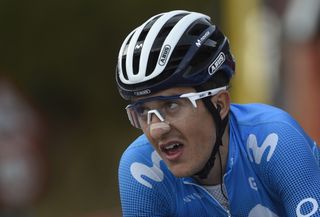
Movistar began the stage with three riders in the top 10, but none in the top four, a scenario that superficially appeared to reflect what has been a persistent problem for the team in recent years — lots of strength in depth but a failure to coherently unify behind one sole, designated leader.
Get The Leadout Newsletter
The latest race content, interviews, features, reviews and expert buying guides, direct to your inbox!
Rather than rally behind a sole leader for GC, in the way that Team Ineos/Sky have done so successfully over the years, Movistar prefer to use multiple co-leaders who take it in turns to make individual attacks. That was again the tactic today, when their rider who was placed 10th overall, Marc Soler, attacked today on the third-to-last climb of the day, the Alto de la Cobertoria.
Their woes at recent Tours de France have made it easy to belittle these tactics, but it’s easy to forget the team used them to win last year’s Giro d’Italia. In that race, Movistar’s duo of Mikel Landa and Richard Carapaz worked in tandem to attack, isolate and ultimately depose the overall leader — who was, incidentally, Primož Roglič.
The difference between then and now is that Roglič has a much stronger team to support him at this race, who without panicking were able to limit Soler’s gains to just one minute, and none of Movistar’s riders have alone looked strong enough to win the Vuelta.
Without a rider as strong as Roglič at this race, the tactics they are using are probably the best the team can do to maximise a high GC finish. A stage win today would have been highly desired no doubt, but Soler’s leap up from 10th to sixth on GC does at least set them up nicely for more attacks like this over the coming stages.
Will the GC contenders regret not attacking Roglič?
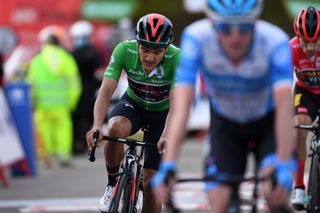
Aside from Soler’s early move, there were no attacks from any of the GC riders today. Jumbo-Visma set a steady pace all the way up the climb, and all the favourites remained together until the sprint to the line, where Hugh Carthy’s (EF Pro Cycling) loss of seven seconds was the only change in the top five overall.
Will they go on to rue this as a missed opportunity? Richard Carapaz (Ineos Grenadiers), Dan Martin (Israel Start-Up Nation) and Carthy will all be aware of the long time trial coming up where they will each expect to lose considerable time to the Slovenian in a discipline he excels at. If any of them are to take the jersey off his shoulders, they’re probably going to have to do it on uphill terrain like today’s, but all of them passed up on the opportunity this time.
Their hesitancy might have been due to being equally aware of what awaits them tomorrow — the Angliru. As the most difficult mountain of the race by some margin it looks sure to be the most decisive moment of this Vuelta, and one that the GC contenders know they have to be on their very top form for.
As much as today might have looked like a chance to gain time, too much of an effort here might have had the adverse effect of then being too tired on the Angliru, and losing lots of time. It’s impossible to know for sure if it was the right call, but it’s easy to understand why there were no attacks.
What next for Esteban Chaves?
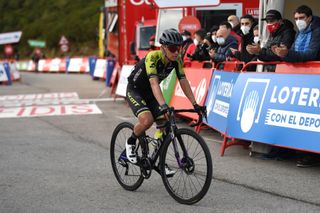
a España 2020 (Photo by David Ramos/Getty Images)
Since being diagnosed with the Epstein-Barr virus a few years ago, Esteban Chaves’ performances at Grand Tours have generally followed a similar pattern — he’ll start well, and look like a possible overall contender for a while, before tiring and falling out of contention.
With this in mind, it seemed inevitable that the Colombian would suffer a bad day sometime soon despite being seventh overall, and sure enough, he was dropped from the peloton halfway up the final climb of the day, Alto de la Farrapona. He ultimately lost over two minutes to Roglič, meaning he slips down to fourteenth overall, ending any hopes he might have had for a podium finish.
It seems increasingly likely that the affable 30-year-old is not going to return to his pre-virus levels, back when he was capable of finishing on the podium of Grand Tours.
So what should be next for Chaves? While a sustained three-week GC campaign now looks beyond him, he’s still proven capable of the odd exceptional day (such as his stage win at the end of last year’s Giro). Perhaps a future of targeting stage wins rather than GC might be more fruitful, or maybe even a prioritisation of the hilly Classics? He did, after all, win Il Lombardia in 2016.
Peloton unites in protest
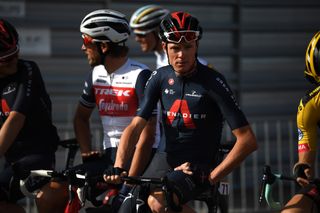
The day began with another protest by the riders, and, unlike what happened at the shortened stage of Giro d’Italia last week, it was good to see them put on a united front.
They delayed the start of the stage by briefly refusing to begin racing in protest of what they saw as a wrongful implementation of the three-second rule at the end of yesterday’s stage.
Chris Froome (Ineos Grenadiers) led the protests, and was seen talking with the race organisers. He might not be a player in the race for the red jersey this year but today he fulfilled the role of ‘patron’, and the way everyone united behind him indicates just what a respected figure he is.
The fact that even the team who benefited most from the commissaires decision to give time gaps, Jumbo-Visma, also joined in the protest suggests that the peloton was largely in agreement in this case.

Thank you for reading 20 articles this month* Join now for unlimited access
Enjoy your first month for just £1 / $1 / €1
*Read 5 free articles per month without a subscription

Join now for unlimited access
Try first month for just £1 / $1 / €1
Stephen Puddicombe is a freelance journalist for Cycling Weekly, who regularly contributes to our World Tour racing coverage with race reports, news stories, interviews and features. Outside of cycling, he also enjoys writing about film and TV - but you won't find much of that content embedded into his CW articles.
-
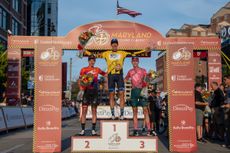 Lidl-Trek, EF Education-EasyPost among first teams to seize ‘the only chance to race in the United States’
Lidl-Trek, EF Education-EasyPost among first teams to seize ‘the only chance to race in the United States’With a world-class field of competitors, organisers hope to showcase professional cycling to American spectators and reignite fan interest
By Anne-Marije Rook Published
-
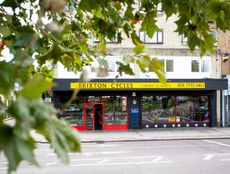 'This sucks': Brixton Cycles closes its doors after 42 years
'This sucks': Brixton Cycles closes its doors after 42 yearsIconic London shop announces closure after premises listed on property site
By James Shrubsall Published